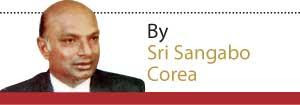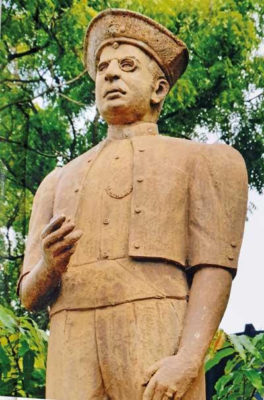“THE NAME SAYS IT ALL” – By Des Kelly
THERE IS ABSOLUTELY NO NEED FOR ANY FORMAL
INTRODUCTION TO THIS STORY. THE NAME SAYS IT ALL.

Desmond Kelly.
(Editor-in-Chief) eLanka.
Resolute leader and gentleman of integrity – 149TH BIRTH ANNIVERSARY OF CHARLES EDWARD VICTOR SENEWIRATNE COREA

Source:Daily Mirror
It will always be a matter of pride and gratification to the people of Sri Lanka that the struggle for political emancipation was launched, supported and sustained by a long line of patriots so fired by their devotion to make this country a better place to live in, rid of the shackles of alien rule.
The road to independence has been a hard and rugged one. Immeasurable therefore is the country’s debt to those intrepid pioneers for the courage and determination they showed in the face of insuperable odds to launch and carry out their campaigns. One such pioneer was …
Charles Edward Victor Senewiratne Corea of ‘Sinhapura’ Chilaw
Charles Edward Corea – proctor had three sons and two daughters – Charles Edgar (C.E.), Alfred Ernest, Agnes, Evangeline and Victor. When Victor was only an year-old, the young family lost their father and they came under the sole guidance and upbringing of their mother Henrietta, a young widow of 21 who sought to implant in them the spirit of their father and nurture them in traditions of a family that sought to free the country from the incubus of an alien yoke. Independence Day Supplements issued by Daily Mirror on February 4, 2013 and 2014 celebrating 65 and 66 years of independence has this to say about Victor Corea:
“ As well as being a successful advocate and politician, Victor Corea also spent much of his time fighting for Sri Lanka’s independence against the British or against anyone or anything where there wasn’t justice. He fought fearlessly with the help of his older brother Charles Edgar Corea and became two of the most famous political figures their country had ever seen, and were particularly well-known in their hometown Chilaw.”
Charles Edgar entering Royal College had a brilliant career and made his mark as an outstanding speaker and matchless debater. He passed out as a proctor, joined the Chilaw Bar and rose to the top of his profession. He exerted himself professionally on behalf of the victims of oppressive laws and made his services freely available to villagers. He formed the Chilaw Association to safeguard the rightsof the villager which before long became the most powerful political body in Ceylon.
Alfred Ernest went to S. Thomas’ College and later passed out as a doctor. During the deadly ‘Parangi’ epidemic, Dr. Corea volunteered to work free-of-charge when no one was prepared to run the risk of exposing themselves to the epidemic. Victor too entered S. Thomas’ College and later passed out as an advocate of the Supreme Court practising in Chilaw, Puttalam and Kuliyapitiya courts.

“Mahatma Gandhi paying a glowing tribute to Victor Corea presented him with a coloured poster captioned ‘FIGHTERS FOR SWARAJ’”
Young Lanka League – March 2, 1915
Victor Corea was a firm believer that the youth of the country should be trained to play a significant role in nation-building. His sole objective was to instill in the minds of the youth that they were the future leaders of the country and that it was their responsibility to groom themselves to play that vital role. He was the founder-president of Young Lanka League and in order to inspire the youth to undertake such responsibility, he spent a vast sum of his own money in purchasing a printing press, housing it and recruiting staff to launch the journal titled ‘Lanka Tharuna Handa’ which will inspire the formation of a young dynamic force.
Sinhala-Muslim riots – 1915
During the Sinhala-Muslim riots of 1915, Victor Corea and his brother C.E. Corea protected the Muslims in Chilaw from the wrath of embittered Sinhalese and thanks to their intervention, the people of Chilaw were exonerated from paying damages which was a penalty imposed on all citizens of Ceylon.
“Victor Corea was a firm believer that the youth of the country should be trained to play a significant role in nation-building”
Religious harmony
Victor Corea respected all religions. He was responsible for building the Buddhist temple and pirivena in Chilaw and obtaining the spot to erect a Buddhist shrine in Colombo Fort. By tradition, he was the lawyer for Munneswaram Temple and was also the legal adviser to the Bishop of Chilaw, Rt. Rev. Dr. Edmund Peiris OMI.
Nation-building efforts – 1924
Victor Corea presided over a meeting at Tower Hall where a packed audience of Sinhalese, Tamils, Muslims and Burghers met and pledged to be united. At this meeting, he was acclaimed as a great national hero in believing that all races living in Ceylon should unite sinking their differences for the greater glory of the country. Whenever a rift occurred between the North and South, Victor never permitted that rift to widen into a gulf. Many a time, he crossed the Elephant Pass and stretched his hand of friendship to Tamil leaders and the rift became a bedrock of goodwill.
First President of Ceylon Labour Union – 1920
When A.E. Goonesinha formed the Ceylon Labour Union to fight for the rights of Ceylonese workers, he was determined to have a president endowed with courage and the will to give the union a fearless and astute leadership. The popular choice was Victor Corea who gave the labour union the desired brand of dynamic leadership with an aura of respectability.
“Victor Corea respected all religions. He was responsible for building the Buddhist temple and pirivena in Chilaw and obtaining the spot to erect a Buddhist shrine in Colombo Fort”
Poll tax – 1922
When the British Government imposed the iniquitous Poll Tax requiring ALL MALES above 21 years to pay the government Rs.2, Victor Corea relentlessly opposed it on the grounds that the majority could not afford it and publicly declared that he was prepared to go to jail and fight against it to the bitter end. Under the scorching heat of the sun, he was made to break boulders with a pickaxe on the public highway. Inside the jail, he was made to beat coconut husks and twist coir rope and in the night he had to sleep on a wooden plank with no pillow to rest his head. The desire to see the spectacle of their hero fighting their cause drew unprecedented crowds which kept increasing each day.
His palms were covered with blisters but he decided to suffer in silence without complaining. He lived on plain bread and water throughout his month’s stay in jail and finally when the British Government decided to abolish the Poll Tax and release Victor Corea, his popularity was such that he came all the way from Chilaw and decided to contest E.W. Jayewardene (President Jayewardene’s father who was his relative) and won the election by an overwhelming majority as the member for Colombo North in the Legislative Council of Ceylon.
Mahatma Gandhi’s glowing tribute to Victor Corea – 1927
Victor Corea launched a campaign to inculcate a feeling of nationalism and a distaste for what was alien and foreign as was done by Mahatma Gandhi in India. Mahatma Gandhi in 1927 accepted an invitation from the Corea brothers, C.E. and Victor, to be their guest at ‘Sigiriya,’ a stately and exquisitely designed residence that belonged to the Corea family in Chilaw.
At a banquet given by the Corea brothers in his honour, Gandhi paying a glowing tribute to Victor Corea presented him with a 15” x 20” coloured poster captioned ‘FIGHTERS FOR SWARAJ’ in which all Indian patriots who fought fiercely for India’s independence were individually featured in oval shaped, bust size photographs with Victor Corea’s photograph also included in appreciation of the campaign he launched in Ceylon which gave added strength to Gandhi’s campaign in India. Such was the high regard and respect Mahatma Gandhi had for his partner in the fight for their country’s independence!
An entire village turns to Victor Corea
The villagers of Merawela in Chilaw earned their living through the limestone business. When the British Government vested the business as a State monopoly and villagers found themselves helpless without a source of income, the seniors in the village went in a deputation to Victor Corea’s residence pleading for his support. He fought for their rights and had the business restored.
Beating of Hewisi in Dalada Maligawa
Although a Christian, Victor Corea rose in protest against the order sent to Diyawadana Nilame by the Government Agent in Kandy, a Britisher to stop forthwith the beating of hewisi because it was a source of disturbance to his wife. Victor Corea rose on that occasion to display the courage he was well-known for by asking the GA to shift his residence and that the beating of hewisi must continue in accordance with tradition. If the DN were not prepared to resume the beating of hewisi, Victor Corea solemnly promised that he would come to the Maligawa and make sure the beating of hewisi was resumed. Since Victor Corea by that time was known to be a man who lived up to his promise, the GA withdrew his order fearing there would be unrest in the country.
Unveiling of his statue
On December 2, 2008, the life-size statue of Victor Corea was unveiled adjacent to the Chilaw District Court by Urban Council Chairman Hillary Prasanna Fernando in the presence of a large gathering of residents and well-wishers in Chilaw.








No Comments